Hello and welcome to our September issue of successful Kickstarter video game campaign analysis! As with every month, there was certainly a lot going on in both the closing campaigns and ones which launched during the time period. We’re here to take a look at the projects which found themselves funded at some point between September 1 and September 30 and were either a video game specifically or some form of gaming-related item (gaming documentary, convention, etc.). One obviously big ticket project for the month was none other than Divinity: Original Sin 2 by Larian Games, who you may recall successfully funded the first title via Kickstarter as well. Of course, it was not the only notable game this month. Before we dig into the analysis itself, let’s take some time to highlight five cool crowdfunding items.
Note: All non-US $ amounts have been converted to dollars based on exchange rates as of this writing.
Aquanox Deep Descent (Previous Coverage)
Raised: $95,979 of $75,000 goal
Days to Success: 15
Backers: 2,060
Aquanox Deep Descent was a Kickstarter that actually set my alarm bells off for a moment. After doing these articles for so many months, and simply obsessing over Kickstarter, I’ve seen some things. Particularly, I’ve seen how sometimes good-looking campaign pitches might be coming from people who do not own the property they’re hoping to revive! Luckily, Aquanox Team does legitimately have the rights to create Aquanox Deep Descent even though it has been years since the last Aquanox game. Despite its aged status, tons of backers flocked to the project and helped it achieve nearly $100,000 in funding. Now what? We’ve got to wait all the way until February 2017 to actually play. Please note that if you missed out and wish to pledge that a Kickstarter-like PayPal pledge page has since gone up.
Raised: $8,136 of $5,000 goal
Days to Success: 14
Backers: 313
Months ago, in the midst of Yooka-Laylee’s campaign, I suggested that we were seeing the start of a generational shift in nostagia. We’ve all seen indie games with their 8 and 16-bit styled graphics for years now, but here was a game focusing on Nintendo 64 sensibilities instead and making big money thanks to it. OmniBus is yet another success which follows in the same general footsteps. Only this time, it’s a PlayStation 1-inspired game about a ridiculous bus which crashes around a city. As far as PS1 games are concerned, it honestly looks like something which could have appeared on the platform (if you disregard the fairly stable far draw distances, anyway). It raced through its funding goal with little issue as well. Folks should expect to get their hands on OmniBus around February 2016.
SnarfQuest Tales (Previous Coverage)
Raised: $37,282 of $30,000 goal
Days to Success: 38
Backers: 652
Here’s a bit of information that may upset some of you out there who happily backed SnarfQuest Tales on Kickstarter. Until this campaign launched, I had no clue at all about what the heck a “Snarf” was or where it came from. Sorry! Once looking into it a bit more, I understood why SnarfQuest Tales would be a meaningful game for people and expected it to do quite well on Kickstarter. In the end, the project was definitely funded, but not to an immensely strong degree. Aside from the possible unfamiliarity many others had with it, I can’t help but feel that 30+ day funding periods are just a bad idea. We continue to see how these extra days do nothing to help and instead only elongate the stress of last minute funding. Luckily, SnarfQuest Tales made its goal in the very final few days and is now planned for October 2016 launch.
Tacopocalypse (Previous Coverage)
Raised: $10,924 of $10,000 goal
Days to Success: 28
Backers: 170
Tacopocalypse was one campaign this month that kept me on edge. The concept, presentation, and name itself were so amusing that I knew this was something I would want to play down the road. Basically, Tacopocalypse is a lot like an extreme sport game (Tony Hawk, etc) except wrapped up in a taxi-driving experience. The mentality of the game is one which is definitely alluring, but it seems that either many people never heard of it or simply weren’t looking for a wacky taxi title. By the end, it was funded, but only just barely in the final two days. We’ll be able to drive around the apocalyptic city of Tacopocalypse either by the end of this year or early 2016.
Raised: $39,156 of $35,000 goal
Days to Success: 42
Backers: 1,225
Tsioque is the other game during September which absolutely freaked me out every time I checked its Kickstarter page. Developer OhNoo Studio previously saw crowdfunding success with the downright gorgeous and disturbing Tormentum – Dark Sorrow on Indiegogo, so it only seemed obvious that Tsiqoue would do even better on Kickstarter. It did, although it certainly stressed out fans (and the developers themselves) during the process. With a 44 day funding period, it was only funded at the very end. Again, developers seriously need to stop utilizing these longer funding periods for their sanity and my own! In any case, this beautiful adventure game is planned for release in October 2016. Those who were unable to pledge during the Kickstarter can now check out the Slacker Backer page.
Well, well, well, after the surprising performance of successful campaigns in August who knew that Kickstarter would bounce back so quickly? In case you missed last month’s article, August was the first month in a while where less than one million was raised cumulatively between gaming projects. But, here we are again with a almost $3.5 million in funds. There are multiple reasons for this and some should be quite familiar to crowdfunding fans by now. As we know, sometimes it only takes one or two huge campaign to totally rock this tallied number. That’s exactly what happened here and is similar to what usually causes such an eye-popping value for the total funded image.
You can probably guess the star game of September. That’s right, it was Divinity: Original Sin 2 with $2,032,434! It only makes sense that this sequel to a tremendously well-loved modern RPG would do absolutely gangbusters on Kickstarter. And so it has, but it was not the only powerful crowdfunding force this month (even if it was the only one to crack a million). The second place belonged to EVERSPACE with its funding ending at $475,746 — yet another space-based title because people just cannot ever get enough of that genre. As for third place? That belonged to a bit of a surprise with Eco which raised $202,760. In case the name isn’t familiar to you, it was described as a “global survival game” and features colorful landscapes and creatures. One thing to note is that all calculated values and information in this September analysis include the stats from My Highschool Crossdressing Romance despite the fact that that campaign was canceled. Why? Because, before it was canceled, it had actually succeeded. Luckily, it’s not contributing much to the data as it only accrued $1,402.
So, now that we know the top performers, let’s take a better look at the entire collection of successful Kickstarters for September. In total there were 27 such campaigns. Now that we know how much was actually raised, let’s see what people were actually asking for. The total goal value was $1,235,120. That’s a pretty strong value in and of itself, as last month the goal was not even at $500,000. Much of the goal value is thanks to the $500,000 required to make Divinity: Original Sin 2 happen. The second and third folks proposing the highest goals were the same as our other top performers for actual funding. It’s a bit surprising how those folks “knew” their projects would attain such levels of success!
As far as actual funding is concerned, the average amount of funds per campaign is steep at around $126,000. Obviously, this number is skewed thanks to our few star performers for the month of September. After removing the top three, the average dips down to a more expected $29,668. This is just proof how much outliers can skew an average! Average goals, without accounting for outliers, sits at around $45,000. Pulling Divinity: Original Sin 2 out of the equation drops cuts the average goal down to $28,312. It’s quite interesting to see how close the goal and actual funding amount averages are so close. To be fair, that’s probably not quite for the best, when you consider that failing to attain your goal means you are left with no funding whatsoever.
September saw an interesting (but not necessarily good) continuation of a new trend. Three campaigns that I marked as “low information” ones were funded. Low information typically means that the project page is lacking in any real effort. There are two or fewer paragraphs of text, as well as two or fewer images (presumably something actually related to the game – screenshots or at least concept art). Without such simple things, the projects simply can’t be considered equal to those which have at least some degree of effort put in. In any case, projects of this nature should have no business being funded. Yet, three did receive between $110 and $481. They must have had friends or family who were interested in seeing their campaigns succeed. I’m not sure how any stranger would ever choose to back something with absolutely no information. This number of low info campaigns is one less than August, but still more than should ever be the case.
How was the timing of funding on each of these 27 Kickstarters? It seems that the trend which had been gaining steam over the past few months was totally broken by September. Six campaigns were funded on their first day which is totally atypical for the service these days. Is it possible that the lack of huge campaigns in August left people with more money to spend on Kickstarter in September? It’s possible, although there’s no doubt that some of the immediate successes (such as BattleCON Online) already had a huge audience ready to be unleashed immediately. Then there’s the whole matter of projects which take over 31 days to be funded because they utilize atypical 30+ day funding periods. Although they seem alluring in theory, I would heavily suggest that most opt against longer term campaigns because they do not lead to more funding. Instead, they lead to to a longer “lull” period and more stress for everyone involved.
Here’s another little tidbit for interested parties. Of the 27 Kickstarters that made it in September, the vast majority were for campaigns running with US $ currency. It was honestly a fair bit more than the usual, although the overall selection of currencies was larger than average for successful projects. This is the exact breakdown: AUD (1), CAD (1), Euro (4), Franc (1), Pound (1), SEK (1), USD (18). It’s worth noting that Franc appears to be a new currency option for Kickstarter and this proves the first occurrence of it arriving on the successful Kickstarter list. Unfortunately, this is a very low information project by the equally low info name of “Awesome Point and Click Adventure Game.”
Well, we’re back to looking at data which generates silly charts like the one above. This graph is meant to depict how many backers provided funding to each of September’s projects. Of course, one reigns supreme above the rest. With 42,713 backers in all, Divinity: Original Sin 2 completely skews the chart so that we can barely see the columns for the majority of other projects. This makes sense though with such a massive campaign. In total, there were 78,556 max backers who participated on Kickstarter this month, though the actual number is most certainly smaller. This results in an average of 2,909 backers for project… at least until you remove our top performer which reveals the average at 1,378 instead.
Let’s take a peek at one final set of averages for September. Average funding per backer is first calculated to be $53. However, this includes some ridiculous averages such as $406 per backer on Phenomenally powerful princess Pink and $177 for Infinitum Strike. These are highly unusual results and simply must be removed from the calculation, which leads us to a new average of average backer pledge of $34. Then there’s the matter of reward tiers. In average, the lowest tier resided at about $4, with the highest averaging out at $2,731. What of the lowest tier which comes with a copy of the Kickstarter game? That average ended up as $13, which is a pretty fair price point for a game reward.
There is always more information to generate from Kickstarter video game campaign data, but these are just the most notable tidbits to us. If you’d like to know something else (more specific to one campaign, or other stats) then please let us know in the comments with inquiries and suggestions. We look forward to continue sharing monthly wrap ups throughout the year! You can review analysis and wrap-up articles from previous months using this link. For a complete list of 2015’s successful videogame Kickstarter campaigns check out this link.
Here’s a look at each successful campaign in a handy table to get a glimpse at (a small sampling of) the information we gathered to make this post possible:

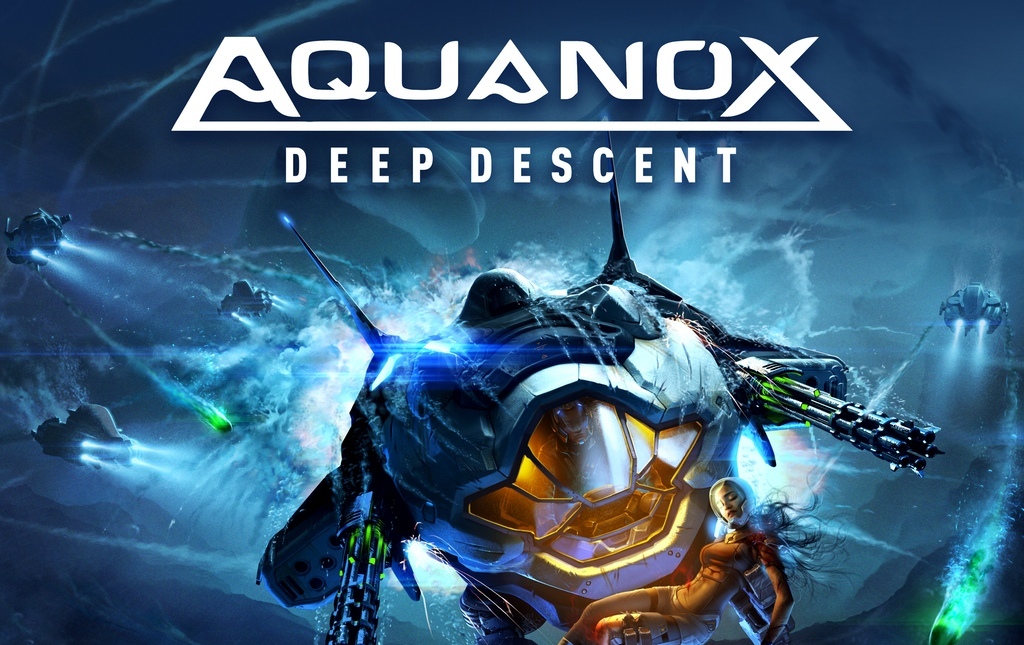
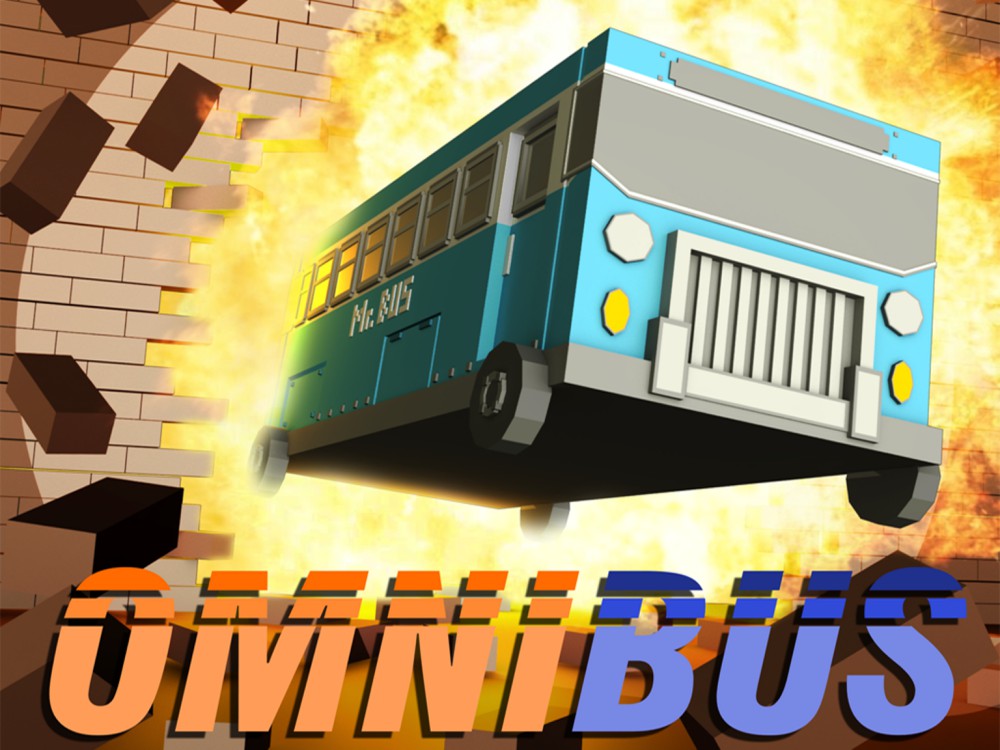

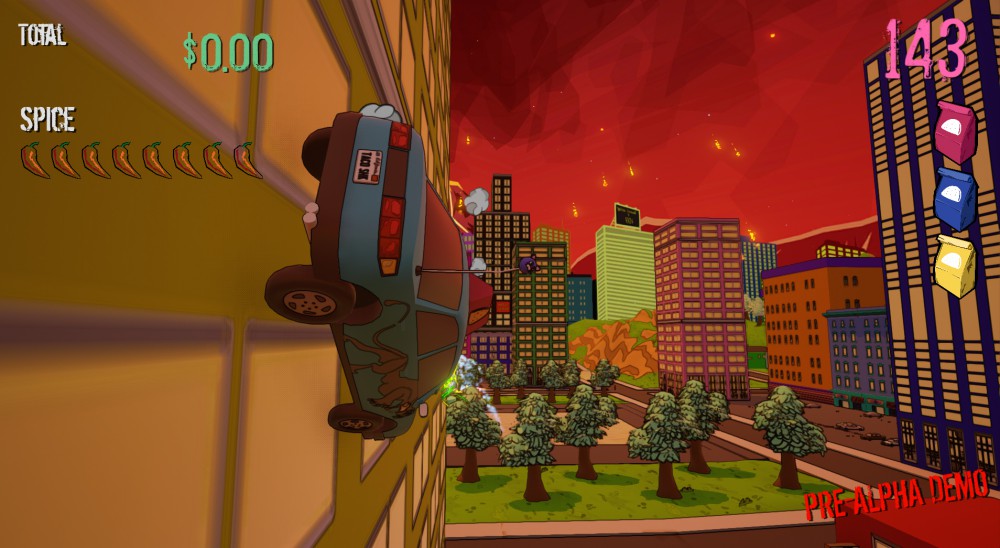

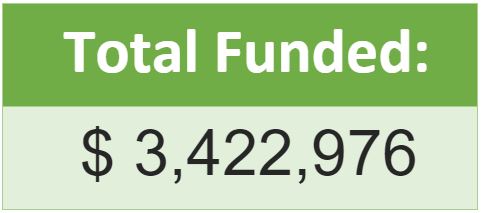
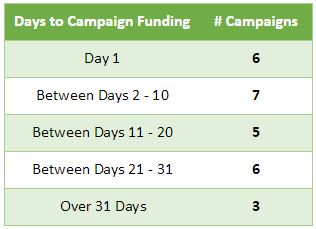
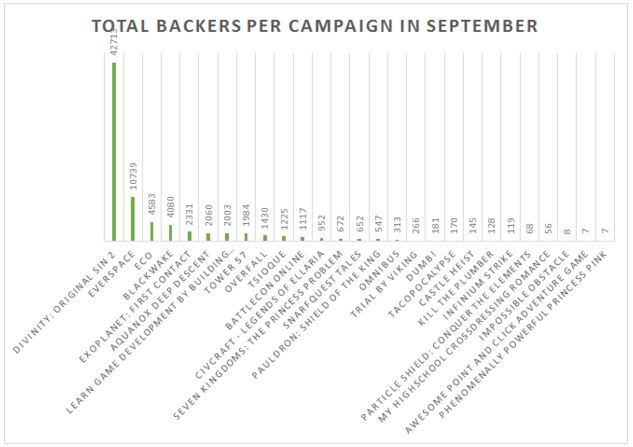
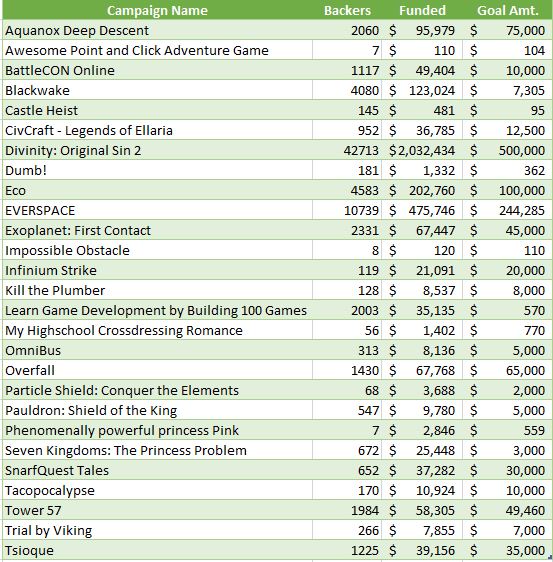



The note about the currencies makes sense – I work for Square Enix Collective and from what we’ve seen on our side (and also what we recommend), campaigns with $ move a lot more than, for example £, even if backers are investing the same exact monetary value. The bigger monetary jump that is the result of a single pledge gives potential backers watching the campaign a feeling that the campaign is moving along well.
The bigger numbers seen as a result of picking $ over £ as a currency also means that a campaign appears to be more successful to people – For example, a game that has a total of £30,000 pledged would basically display as having $46,200 if it used USD. Even though it’s the same amount of money, it’s likely that people will see the $46,200 as more successful than the £30,000 and will thus be more likely to invest money in it.
Oh wow, you work for Square Enix Collective? I can’t help but be a bit jealous :P.
You bring up some really interesting points as well. It’s really interesting to hear these comments about dollar basically being preferable over alternate currencies because people perceive it to be more. It makes sense from a U.S. perspective, certainly, as I don’t offhand understand the value of Pounds or Euros, but am very familiar with dollars.
Do you believe this trend will continue as crowdfunding continues to globalize? Already we see a lot of European/Japanese/etc developers running projects — but still in USD.
Woops apologies for the delayed reply, didn’t see it until now!
It’s difficult to say, honestly – One of the reasons I follow Cliqist is because I’m interested in seeing how your research and data aligns (or doesn’t!) with the kind of trends we believe we’re seeing. Sharing findings helps everyone after all!
Personally, I think the USD currency will continue to be used by teams that want to appeal to a more global audience (majority of people are comfortable with USD) and those that look at the ‘narrative’ of success of a crowdfunding campaign as I described above.
As such, I wouldn’t be surprised if over time more and more successful campaigns will be listed in USD. I’m not saying it’s the magic bullet and will guarantee success, but it might be an indication of how much prep and thought a team has put into their crowdfunding campaign. And, in my opinion, the more prep and thought about all possible aspects of the campaign a team does, the more likely it is that success will follow.
Those are just my views at the moment and I’m just a small part of SE Collective – my team members might have other views or interpretations themselves! 🙂